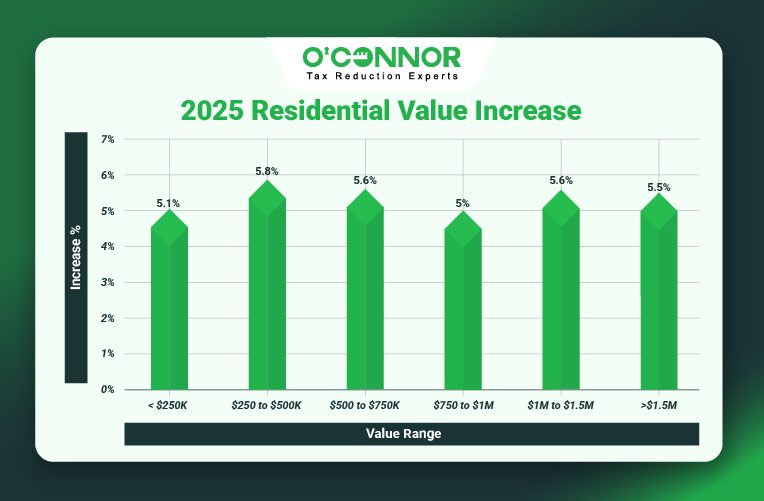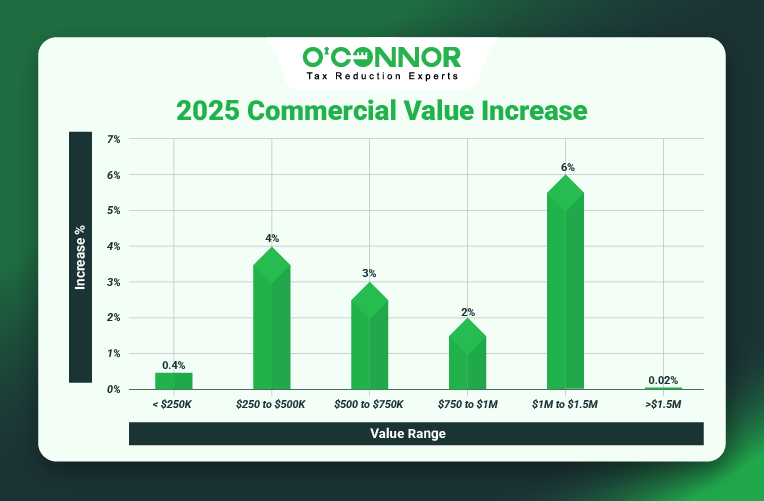Compared to Lake and DuPage counties, Will County does not have a reputation for expensive living. What it lacks in luxury homes it makes up for with beautiful scenery and rural charm. From suburban centers to urban areas like Joliet, Will County is a great hybrid of the many environments seen across Chicagoland. Will County has also become a magnet for people fleeing Chicago proper, as it is a great alternative to pricier suburbs.
Crete Township is one of the idyllic rural areas that can be found in Will County. With the city of Crete at its center, the township has a relatively low population and offers many the perfect escape from city life. Whether by rail or car, Crete Township is still within commuting distance of Chicago and is becoming increasingly a quiet destination for those that want to mix their urban work and rural living. This has led to property values climbing in recent years, especially those for homes. The best way to fight these changing values is with a property tax appeal, something that is gaining traction across Illinois. The deadline for Crete Township is set for September 8, 2025, so there is not much time left.
Crete Residential Property Increased in Taxable Value by 6% in 2025

Like most townships in Will County, Crete’s property values are heavily weighted toward residential properties. This is the same across the county, though the ratio can be skewed higher or lower. Joliet has a strong commercial base, so the number is more balanced than a purely suburban township like New Lenox. In 2025, the combined total for all homes in Crete Township was $1.92 billion. This was a 6% hike from 2024, which itself had been the previous record. When compared to the commercial value of $276.34 million, homes were worth seven times more than businesses.
Crete Township has a long history of being a rural area, and this can still be seen in home values. The largest block of value was homes that were assessed from $250,000 to $500,000. Totaling $1.09 billion, these moderate homes jumped 6% in 2025. These were followed by homes worth less than $250,000, which combined for $728.52 million. These homes only increased in value by 5%, which is a relief for homeowners that are trying to hold on to their properties. Residential property worth between $500,000 and $750,000 came in third place with $133.91 million. These saw a significant increase of 6%.
Even in remote areas, luxury homes are increasingly becoming a factor. This is not always the case for new construction, as some properties are seeing themselves being elevated to a new category thanks to increasing assessments. Despite this growth, homes in the upper tiers are still relative rarities. Those worth between $750,000 and $1 million totaled $15.42 million, growing by 5%. The impact of the next two categories was miniscule but still added to the total. Homes worth between $1 million and $1.5 million combined for $7.54 million, an increase of 6%. True luxury homes worth over $1.5 million only contributed $1.61 million in value, with a growth rate of 5%.
Crete Home Values Lower Other Collar Counties
While not to the levels of Cook County, most collar counties have seen significant jumps in their residential values. The 6% overall bump for Crete Township is certainly troubling, especially for those with lower incomes. However, many other townships have seen even bigger jumps in just one year. In Will County alone, Joliet Township grew by 10%, while Plainfield and New Lenox added 7%. In Lake County, Fremont added 11% to an already high total, while Wauconda saw an uptick of 7%. McHenry Township had some of the highest rates, with both Richmond and Dorr townships increasing by 11%.
Commercial Property Holds its Ground in 2025

As mentioned above, commercial property totaled $276.34 million in 2025. This was an increase of 2% from 2024. While much smaller than the residential total, the importance of these properties cannot be overstated. Commercial property values can have a big impact on a community, especially a small one, and every piece of business real estate represents many jobs. This category also counts apartments, which means any increase usually translates into higher rent. Thankfully, the 2% growth rate is much smaller than what most of the collar counties have seen, which seems to indicate a stable commercial real estate market.
Crete Township follows the typical Illinois pattern when it comes to breaking down properties by worth, albeit not as extreme as other townships. It is the norm for the largest business properties to contribute the biggest share of value. In Crete, businesses worth over $1.5 million combined for a value of $95.42 million. In some townships, these huge pieces of real estate could be worth over 50% of the total, so Crete lags behind that just a bit. These commercial properties only added .02% to their total in 2025, a rare occurrence in Illinois. This is the primary reason why commercial property only grew by a total of 2%, as the largest block essentially held steady.
Outside of the big businesses, the top two blocks of commercial properties were also the smallest. Those worth between $250,000 and $500,000 totaled $55.24 million, while growing 4%. Those worth under $250,000 combined for $53.23, while only adding 0.4% in value. Totaling $31.63 million, properties assessed from $500,000 to $750,000 added 3% in value. The largest increase in value was 6%, which brought properties worth between $1 million and $1.5 million to a total of $20.47 million
The Crete Township Appeal Deadline is September 8
In anywhere in the nation but Illinois, the jump of 6% for residential properties would be considered an outrage. In Chicagoland, this is generally seen as a conservative change, one many are grateful for. Illinois has the second-highest property taxes in the United States, with only New Jersey higher on the dubious totem pole. It should be remembered that tax rates and property values are two different things, and both are increasing every year. While tax rates come from hundreds of government bodies, property values only come from the Crete Township Assessor. Business and homeowners may not be able to lower their tax rates, but they can lower their taxable value thanks to appeals.
Property tax appeals join exemptions as the only way to lower taxable value. While exemptions reduce what can be taxed, appeals can shrink the total value. When put together, these two weapons can cut costs significantly. Appeals and protests enable property owners to get the correct value for their home or business, which means they are only paying what they should. Fair values are rare in Illinois, as governmental bodies are always looking for new sources of revenue. While there have been efforts to fix the problem legislatively, all have failed.
The two main protest types are assessor appeals and Board of Review (BOR) hearings. Those aimed at assessors, also known as informal appeals, are great for simple corrections, such as incorrect classifications or measurements. BOR hearings open up more avenues for savings, including comparison values, unequal appraisal, and more. In Cook County, each of these options has a different deadline, enabling a taxpayer to explore their options. This is not the case in the rest of Illinois, as both appeals share a cut-off date. For Crete Township, this is September 8, 2025, the same as every other township in Will County. This means that a taxpayer must hurry if they wish to get their taxable value correct.
Let O’Connor Guide Your Appeal Journey
The hour is growing late, and the deadline will soon be here. If you are looking to protest your business or home values, you must act now. There is much to do as you consider an appeal. You will need photographs, paperwork, records, and more to verify your property’s characteristics. If you wish to appeal on an unfair assessment, that requires records for the sale of similar properties. This is all in preparation for your meeting with the assessor or your BOR hearing. It can be overwhelming, which is why we at O’Connor are here to help.
As one of the largest property tax firms in the nation, we at O’Connor have the resources, connections, and people to help get you the best deal. We not only have a national presence to use, but we also have a local branch office ready to serve Chicago and the collar counties. Based out of Aurora, our branch office features tax experts, attorneys, and appraisers that know how Illinois works. No outsider could hope to tackle the complexities of Illinois law or know how best to prepare evidence for the BOR. This is why we wanted to get homegrown talent in the area to help our clients.
When you join O’Connor, you not only get a great team, but you get a partner that will coordinate with your attorney or legal team to get you the best possible outcome. We will gather evidence, information, and do valuation analysis that will dazzle during your appeal. With this data at their disposal, your legal team will be able to put forward the best evidence possible, whether it is the BOR or the assessor themselves. Also, you will never be charged by us upfront. Instead, you simply pay a contingency fee if your taxes are lowered.

